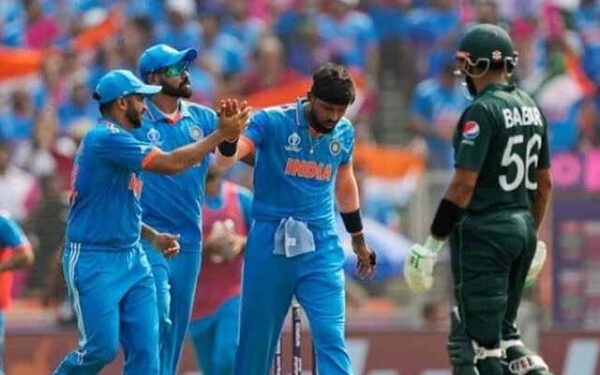Lahore – Uncertainty looms over India’s participation in the upcoming Asia Cup 2024, scheduled tentatively from September 12 to 28, as diplomatic tensions between Pakistan and India continue to cast a long shadow over cricketing ties between the two arch-rivals. While the Asian Cricket Council (ACC) remains hopeful, especially after both teams were placed in the same group for the upcoming Women’s World Cup, no official confirmation has been received from the Board of Control for Cricket in India (BCCI) regarding its participation.
Diplomatic Deadlock Overshadows Cricketing Calendar
India and Pakistan, despite being two of the most passionate cricketing nations, have struggled to maintain bilateral cricketing ties over the past decade due to ongoing political disputes. As a result, matches between the two are limited to multinational ICC and ACC events, with neither country hosting the other for full-fledged tours.
The ACC has been trying to navigate these turbulent waters with innovative solutions. Last year, during the Asia Cup 2023, Pakistan hosted the event under a hybrid model, where India’s matches were shifted to Sri Lanka to avoid a direct visit by the Indian team to Pakistan. While this model ensured the tournament proceeded smoothly, it was not a long-term solution.
In the build-up to this year’s event, a mutual understanding has reportedly been reached between the Pakistan Cricket Board (PCB) and the BCCI to avoid hosting each other’s matches on their respective soils. This agreement, which is expected to take full effect starting with the Champions Trophy 2025, includes staging matches at neutral venues, such as the UAE, Sri Lanka, or Oman.
UAE Likely to Host the 2024 Asia Cup
Given the complications around Pakistan and India hosting each other, the 2024 Asia Cup is now expected to be held in the United Arab Emirates (UAE) — a venue both nations have used in the past for hosting international matches. The weather, logistics, and infrastructure in the UAE are well-suited for a tournament of this scale, and the region has previously hosted multiple successful editions of the Asia Cup and IPL playoffs.
The tentative dates for the Asia Cup are September 12 to 28, providing a crucial window before the start of the ICC Champions Trophy 2025 and other bilateral series in the international calendar.
However, as of now, India has not officially confirmed its participation to the Asian Cricket Council, raising concerns about the tournament’s structure, viewership, and financial viability.
Broadcasting Rights and Financial Stakes
The commercial stakes for the Asia Cup are significant. In 2023, Sony Pictures Network India (SPNI) acquired the media rights for all ACC events from 2024 to 2031, signing a lucrative deal worth $170 million. This includes the Men’s and Women’s Asia Cups, Emerging Teams Asia Cup, and Under-19 Asia Cups.
Given India’s massive cricket viewership and market dominance, its participation is vital for the financial health of the tournament. Any potential boycott or withdrawal from India could have dire consequences for broadcasting revenue, advertising contracts, and sponsorship obligations, making India’s presence indispensable from a commercial perspective.
In fact, recent promotional content released by Sony Sports Network for the Asia Cup featured captains from India, Sri Lanka, and Bangladesh, while Pakistan’s captain was notably missing, sparking controversy and speculation about the uncertainty surrounding India’s participation and political messaging behind the promo decisions.
Optimism from ICC Women’s World Cup Grouping
Despite tensions, a glimmer of hope emerged when the International Cricket Council (ICC) recently placed India and Pakistan in the same group for the Women’s World Cup, and the decision went uncontested by either board. This development has fueled speculation that India may eventually agree to play in the Asia Cup, even if at a neutral venue.
Sources close to the ACC believe this decision indicates a softening stance by India, or at least a willingness to engage in multilateral tournaments, provided they are not hosted on Pakistani soil. While this does not guarantee participation, it certainly strengthens the perception that a boycott is unlikely.
Pakistan’s Potential Response to Non-Participation
If India ultimately chooses not to participate or forfeits its matches against Pakistan, the PCB is considering a reciprocal response in future events, including the ICC Champions Trophy or other ACC tournaments. This tit-for-tat approach, while risky, reflects the mounting frustration within Pakistani cricket circles over India’s continued avoidance of bilateral fixtures.
However, replacing India in the tournament is not seen as a feasible option. From a financial, promotional, and competitive standpoint, no other team can replicate India’s draw. Broadcasters and sponsors heavily rely on India’s presence to maximize reach and profitability. As a result, every effort is being made to ensure India stays in the fray.
ACC Under New Leadership: PCB Chairman at the Helm
Another notable aspect is that the current chairman of the Asian Cricket Council is none other than PCB Chairman Mohsin Naqvi. His leadership in the regional body could play a pivotal role in navigating the delicate diplomatic balance required to secure India’s participation.
Naqvi has reportedly held several rounds of discussions with ACC stakeholders and regional cricket boards to develop contingency plans and alternate hosting models that can accommodate the sensitivities of both Pakistan and India. His role is considered crucial in ensuring a smooth and inclusive Asia Cup.
Women’s Emerging Asia Cup Postponed
In related developments, the Women’s Emerging Asia Cup, which was originally scheduled to be held in Sri Lanka from June 6, has been postponed due to inclement weather. This delay has further disrupted the ACC’s cricketing calendar and underscores the importance of weather-resistant venues like the UAE for future tournaments.
Cricketing Politics and the Road Ahead
The lingering political tension between India and Pakistan continues to hinder the full potential of cricket in the region. Cricket diplomacy, which once served as a tool to bridge divides, now finds itself struggling under the weight of nationalistic fervor and strained foreign relations.
Many former cricketers and commentators have called on both governments to depoliticize cricket, arguing that fans on both sides long to see the traditional rivals clash on the field — not off it. The last bilateral series between the two nations took place in 2012-13, and since then, cricket encounters have been confined to ICC events.
Conclusion: Asia Cup Hangs in the Balance
The Asia Cup 2024 represents more than just a regional cricket tournament — it is a test of diplomacy, unity, and the ability of sports to overcome geopolitical barriers. While the ACC is pushing forward with preparations and exploring neutral venues like the UAE, India’s continued silence keeps the future of the tournament in doubt.
With the countdown to September already underway, a final decision from the BCCI is expected soon. Cricket fans across Asia — and particularly in India and Pakistan — are eagerly awaiting clarity. The next few weeks will be crucial in determining whether the region’s most anticipated cricket rivalry will grace the Asia Cup stage once again.

























